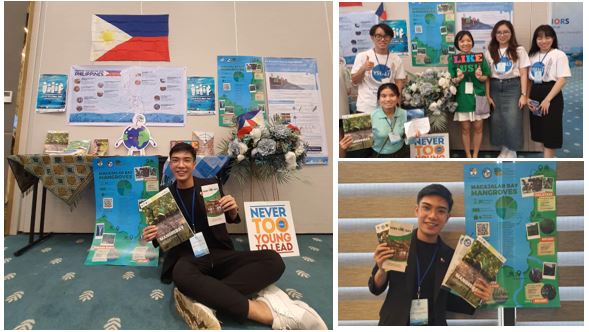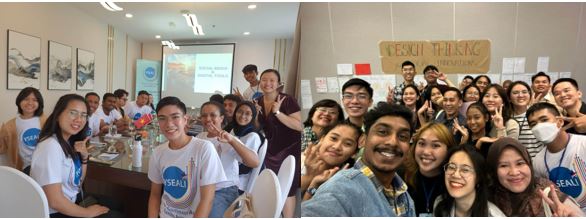By: Margaux Lynz Peña, AB History 4/ SD Volunteer
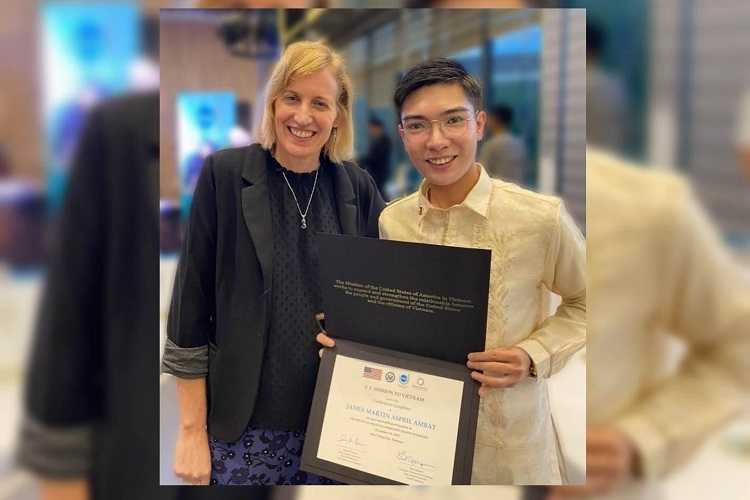
James Ambat with Susan Burns, the U.S. Consul General in Ho Chi Minh City, Vietnam
VIETNAM–James Martin Ambat, a 4th Year AB International Studies student of Xavier University - Ateneo de Cagayan, landed a spot in the exclusive 2022 Youth Southeast Asian Leaders Initiative Regional Workshop: Marine Warriors held last December 1-6, 2022 in Nha Trang, Vietnam. The program was mobilized by the US Embassy in Vietnam, the Young Southeast Asian Leaders Initiative (YSEALI) and World Learning Inc.
The regional workshop brought together 108 participants from ASEAN countries and Timor-Leste to address the critical issue of environmental ocean and coastal pollution by developing leadership and creative problem-solving skills. Site visits to Vinh Luong Fishport and Nha Trang University, the leading university in marine and fisheries science, and technology in Vietnam, as well as skills upscaling helped immerse the participants in the discussions.
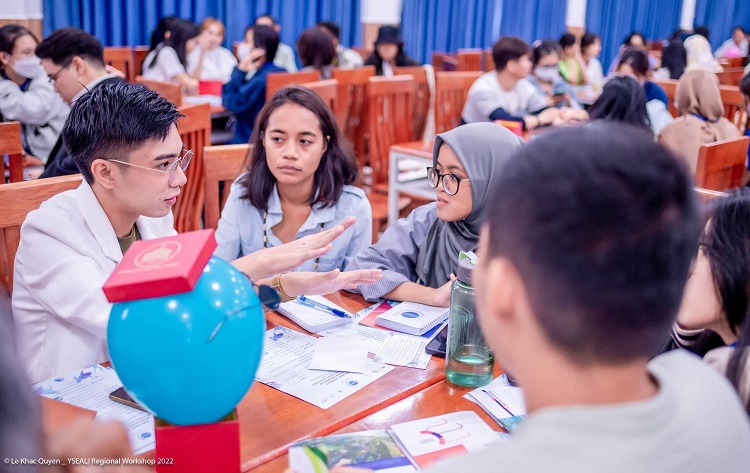
James Ambat interacted with the students from Nha Trang University along with the fellow YSEALI participants
The workshop’s poster exhibit allowed James Ambat to present the projects of XU McKeough Marine Center to a young foreign audience: The Mangrove Rehabilitation in Macajalar Bay (MANGREBAY) Project and the Macajalar Bay Development Alliance (MBDA). As of 2021, the MANGREBAY Project has successfully planted about 7000 mangrove seedlings. 5,000 mangrove seedlings in Brgy. Buko, Kinoguitan, and 2,500 in Brgy. Binitinan, Balingasag.
The MBDA was established in 2008 with the objectives to strengthen the environmental sustainability of coastal development in Macajalar Bay; promote the investment of funds and effort in coastal ecosystem management and ridge to reef approach; and empower the stakeholders in the conservation and rehabilitation of each coastal resource.
(More about MBDA here.)
James Ambat and Vietnamese volunteers pose with the poster exhibit
The interconnection and dependence on marine resources by ASEAN countries is the driving force behind tackling issues related to them. Tourism and marine industries affect coastal areas, and contribute to the pollution and destruction of seas and oceans.
In a virtual interview, James Ambat shared his insights on the workshop, marine pollution, advocating for marine wildlife and environmental and coastal pollution, the influence of volunteerism, and being one of the few policy-driven delegates in an audience of biologists, marine scientists, and STEM scholars.
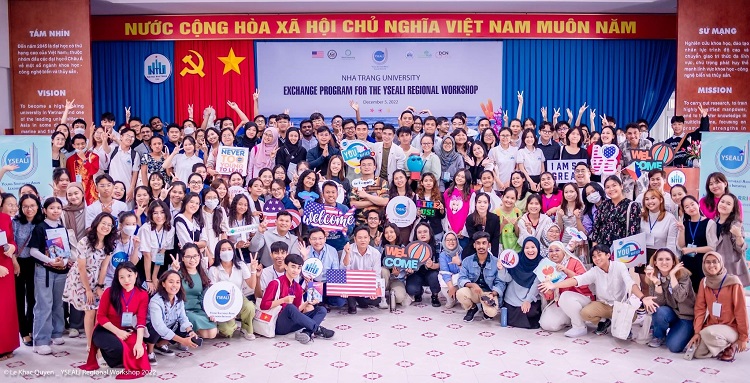
The YSEALI Regional Workshop participants with Nha Trang University students during their Exchange Program
“The concept of Climate Justice was my lightbulb moment. The current climate crisis exacerbates the already existing inequality; climate change doesn’t care about geography and most of the nations in the Global South are the ones who bear the brunt of the effects of climate change. While they have lesser emissions, they’re the ones most vulnerable to the climate impacts such as drought, typhoons, and heatwaves, and this will continue to worsen in the coming years. This means that if the largest emitters and polluters are not held accountable, this inequality will widen. Hence, climate reparations and climate negotiations are needed to shape public policy. For us to address climate change, we need systemic change.”
On the importance of advocating for marine wildlife and environmental and coastal pollution in helping the country, Ambat said, “The Philippines has one of the longest coastlines in the world. Without realizing it, pollution has already entered our food chain. Several studies have shown the presence of microplastics in marine life and it’s a threat to the oceans, marine health, and even our public health.”
The participants in their Social Media and Design Thinking workshop
The influence of volunteering in the XU Social Involvement and Advocacy Program (SIAP) prepared Ambat into being a YSEALI delegate. When asked about this, he enthusiastically responded, “Being close to the communities really helps. My engagements in SIAP has helped me learn that you have to speak the language of the community in order to communicate with the community better. Making communities understand better is through making things relatable instead of drowning them in jargons. It’s tough when you intend to impart an impactful message but your delivery falls flat.” Besides being an XU SIAP volunteer, Ambat is also the Director of the Advocacy Division - FOURward Agenda of the XU Central Student Government - Office of the Vice President.
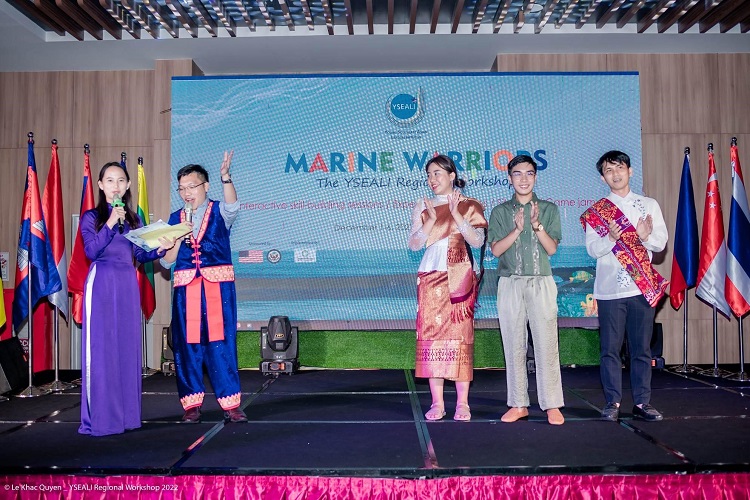
James Ambat was recognized as one of the winners for the social media challenge
When asked about being one of the few policy-driven delegates in an audience of biologists, marine scientists, and scholars of STEM, and if he felt an informational gap when the science behind advocacies were discussed, he answered, “It was challenging because science and humanities and social sciences may have different ways of tackling the issues. While STEM scholars may make insights and analysis from scientific data, I was more focused on the policy side. Being an International Studies student helped me understand how policies work, mapping out geopolitical issues and such when a policy is enacted, and the people involved in it. The workshop has also helped me understand how the current climate crisis has an implication socio-economically and politically.”
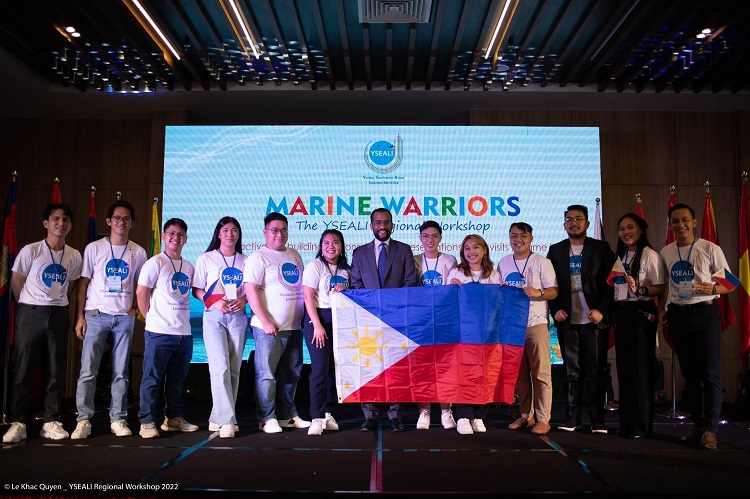
The Philippine delegates with Ambassador Yohannes Abraham, the US Ambassador to ASEAN
Concluding the interview, Ambat thanked the people and institutions who helped him prepare for the overseas workshop. He mentioned the University President Fr. Mars Tan, the XU SIAP Office–specifically Sir Nestor Banuag Jr. and Ms. Keziah Mallorca, the XU McKeough Marine Center, Ms. Ruby Jane Rivera, CAS-PFC, the XU United Arts and Sciences Student Council, and Vice Mayor Jocelyn Rodriguez.
Photo credits: Lê Khắc Quyền and YSEALI
